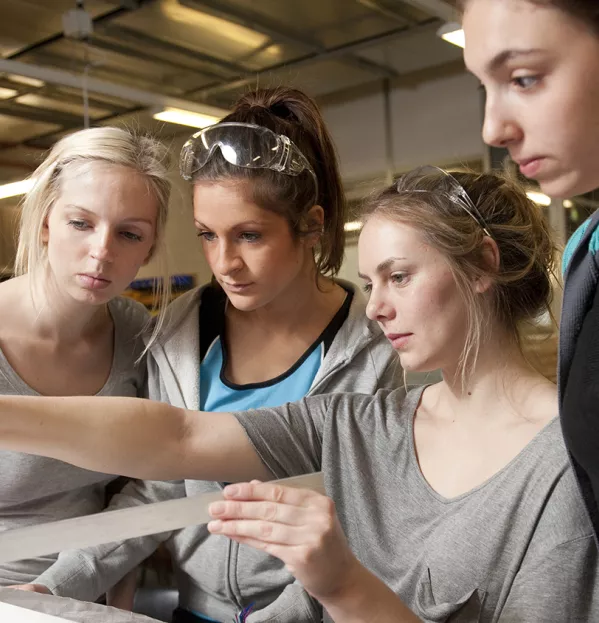‘Girls should feel like they can study any subject’

Girls are doing significantly better than boys in high-level school qualifications - even in subjects that tend to attract far more boys, a new report shows.
Yet the same research highlights that girls remain unlikely to take subjects such as physics and computing, and are drawn in hugely disproportionate numbers to qualifications associated with lower-paid professions.
The “worrying” analysis has prompted calls for more female role models in science, technology, engineering and maths (Stem) and a concerted effort to end gender stereotyping around careers. The Scottish government report - Learner Journey: analysis of Scottish education and training provision for 15- to 24-year-olds - draws on data from a wide range of existing research, which often shows girls and women doing better.
In school qualifications, even though there are slightly fewer girls in Scotland’s secondary schools, they provide 55 per cent of entries at both Higher and Advanced Higher. Boys predominate in lower-level qualifications, such as National 2, with 62 per cent of entries.
Better results
Girls also post better results at both Higher and Advanced Higher - and outperform boys in Higher subjects where there are far more boys. At Advanced Higher, the report says, girls do better in “male-dominated” subjects such as computing science, physics and mathematics of mechanics.
Yet girls largely avoid subjects such as engineering science and computing science (with just 8 and 15 per cent of Higher entries, respectively). In stark contrast, they provide an overwhelming majority of Higher entries in childcare and development (95 per cent) and care (92 per cent).
Talat Yaqoob, director of Equate Scotland, which promotes gender equality in Stem, says that “when girls do take Stem subjects, they perform just as well - if not better - than boys”.
She adds that the report “clearly evidences that the gender segregation between subjects is not about competency or merit, it is about choices made through the influence of gender stereotyping”. Yaqoob says it is “crucial” that both girls and boys see the “full spectrum of careers” - to prevent girls being “locked out” of sectors where jobs and economic growth are forecast to grow, such as engineering, computer science, manufacturing and physics.
Patrycja Kupiec, director of YWCA Scotland - The Young Women’s Movement, describes the Stem figures as “worrying”. “As a young woman and someone with a background in and passion for Stem, I often felt like I had to work twice as hard to prove myself as a scientist - and my career choices were constantly questioned,” she says.
Kupiec adds that “girls should feel like they can study any subject, whether it is dance or engineering science”, but that “at some point in their learner journey, they don’t feel comfortable pursuing Stem subjects - and that it is certainly not because of lack of ability”. She argues that “amazing” Stem role models such as Hedy Lamarr, Jocelyn Bell Burnell and Sabrina Pasterski are not talked about enough, a belief which drives her organisation’s 30 Under 30 campaign, profiling inspiring young women from Scotland.
‘Break down barriers’
An EIS teaching union spokesman says it is doubtful whether girls and women “are being rewarded for their success as learners”. He agrees that girls “are still self-limiting in terms of subject choice” and generally end up with lower incomes in adulthood.
Glasgow City Council education director Maureen McKenna, who is chair of the National Profile-Raising Group for Mathematics, says: “In some respects this data is disappointing and makes it clear that we all still have work to do to break down the barriers to gender stereotypical subjects. This must begin at the earliest possible stage of a child’s education, so that we stamp out any bias from the start.”
Amanda Gray, a PhD student in geology at Heriot-Watt University in Edinburgh, also works for the Stemettes, a social enterprise that aims to inspire girls into Stem careers. She says: “The brilliant thing that this report shows is that gender stereotypes surrounding Stem are wrong - not only are girls interested in Stem subjects, they are really good at them, too.” But Gray adds that there remains “a challenge ahead” to inspire more girls into Stem, and recalls that it was her father who encouraged her more than anyone at school.
Despite being captivated by science from a young age - David Attenborough’s first Planet Earth series was an inspiration - and taking three sciences at Standard Grade, Gray says: “I never remember a careers adviser saying, ‘You should be a scientist.’”
However, John Forsyth, policy manager at Families Need Fathers Scotland, says the data also shows that “clearly something is going wrong for boys”.
He urgently calls for the government to analyse disparities between male and female school attainment, “to discover why and how boys are being let down”.
A Scottish government spokeswoman says equity is a key theme in its Stem strategy for education, which promotes a better gender balance in Stem subjects and careers. The government also supports the Institute of Physics’ Improving Gender Balance project, which challenges gender stereotyping in schools and nurseries.
She adds: “Our Stem strategy will expand this project to all schools, to further raise awareness of gender bias with parents, families and teachers, and to encourage more girls to aspire to Stem studies and careers.”
You need a Tes subscription to read this article
Subscribe now to read this article and get other subscriber-only content:
- Unlimited access to all Tes magazine content
- Exclusive subscriber-only stories
- Award-winning email newsletters
Already a subscriber? Log in
You need a subscription to read this article
Subscribe now to read this article and get other subscriber-only content, including:
- Unlimited access to all Tes magazine content
- Exclusive subscriber-only stories
- Award-winning email newsletters